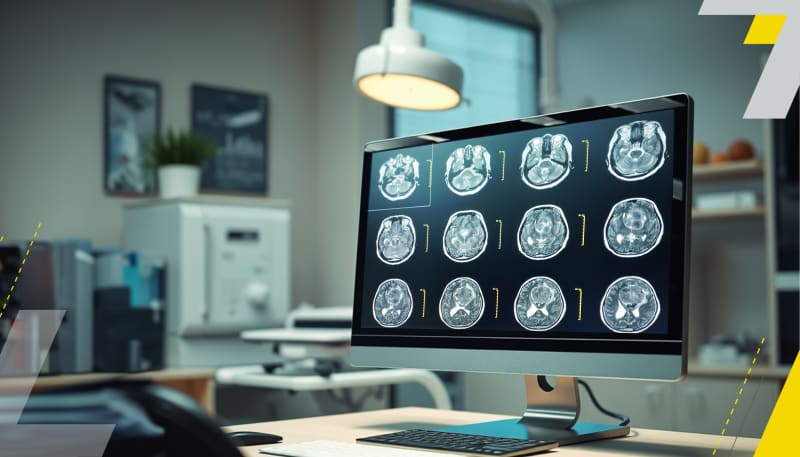How AI is Revolutionising Healthcare in the NHS
Imagine a world where your doctor can predict a heart attack before it happens, tailor your treatment to your DNA, and even perform surgery with robot-like precision all in real-time. This isn’t science fiction; it’s the future of healthcare, powered by AI. AI is making significant strides in transforming the healthcare industry, particularly within the NHS. By integrating AI into various aspects of patient care, the NHS is enhancing efficiency, improving patient outcomes and personalising treatment plans.
AI in Diagnostics and Patient Monitoring
One of the most impactful applications of AI in healthcare is in diagnostics. AI algorithms can analyse medical images, such as X-rays, MRI’s, and CT scans, with remarkable accuracy and speed. For example, AI tools are now assisting radiologists by detecting early signs of diseases, often identifying abnormalities that might be missed by the human eye. This not only speeds up the diagnostic process but also ensures that patients receive timely treatment, improving survival rates and quality of life. An instance of this is Moorfields Eye Hospital in London partnering with Google’s DeepMind to develop an AI system that can detect over 50 eye conditions with unprecedented accuracy, significantly reducing the time needed for diagnosis.
AI is also being used to monitor patients remotely, a critical innovation in the era of digital health. Virtual wards equipped with AI systems can track vital signs and alert healthcare providers to any concerning changes. This allows for continuous care and early intervention, reducing the need for hospital readmissions and allowing patients to recover in the comfort of their homes.
Personalized Medicine and Treatment
AI’s ability to analyse vast amounts of data also plays a key role in personalized medicine. By examining patient histories, genetic information, and even lifestyle factors, AI can help doctors tailor treatments to an individual. This means that therapies can be more effective and target specific aspects of a patient’s condition rather than applying a one-size-fits-all approach. For example in oncology, AI can assist in creating personalised treatment plans based on the genetic makeup of a patient’s tumour, leading to more targeted and effective cancer therapies. This approach not only enhances treatment outcomes but also reduces the likelihood of adverse side effects.
Detecting Cancer
AI is also enhancing the early detection and diagnosis of breast cancer through advanced tools like MIRAI. MIRAI is an AI-based breast cancer detection system that leverages deep learning algorithms to analyse mammograms more accurately and efficiently than traditional methods. It can predict the risk of breast cancer several years in advance, significantly improving early detection rates and enabling personalised screening strategies. This technology reduces false positives and negatives, supports radiologists in making more informed decisions, and ultimately improves patient outcomes by facilitating earlier intervention and treatment.
AI-Powered Robots for Surgery
AI-powered robotic surgery is one of the most exciting advancements in the field. These robots are designed to assist surgeons with precision tasks that require a level of accuracy beyond human capabilities. For instance, robotic systems like the Da Vinci Surgical System use AI to guide the surgeon’s hand movements, enabling minimally invasive procedures with enhanced precision. This can result in smaller incisions, reduced blood loss, quicker recovery times, and lower risk of complications. AI also helps in planning the surgery by analysing data to determine the best approach, making surgeries safer and more efficient.
The Future of AI in Healthcare
Looking forward, the potential of AI in healthcare is vast. Predictive analytics powered by AI could foresee patient health trajectories and enable pre-emptive care measures before a condition worsens. AI could also revolutionise drug discovery, accelerating the development of new medications by predicting how different chemical compounds will interact with targets in the body.
Robotic surgery is another area where AI could have a transformative impact. With AI-driven precision, surgeries could become less invasive, reducing recovery times and improving patient outcomes. This would not only improve access to high-quality surgical care but also reduce the burden on healthcare professionals, allowing them to focus on more complex decision-making and patient care.
AI’s ability to analyse large datasets could significantly advance medical research, identifying new correlations and insights that were previously unattainable. This could lead to the discovery of new treatment protocols, early detection methods, and even the cure for diseases that are currently deemed incurable.
Challenges and Considerations
Despite the promising advances, the integration of AI in healthcare comes with challenges. Ethical considerations, such as data privacy, transparency, and bias in AI algorithms, must be carefully managed. The NHS has already begun addressing these issues, ensuring that AI is implemented in a way that prioritises patient safety and trust.
In conclusion, AI is poised to revolutionise healthcare in the NHS and beyond. By enhancing diagnostics, personalising treatments, and enabling continuous patient monitoring, AI is set to improve patient outcomes and the efficiency of healthcare systems. While AI can process data at lightning speed, the human touch remains irreplaceable. Doctors’ empathy and judgment will still be crucial in interpreting AI’s recommendations and making the final decisions. As AI systems become more prevalent, there is an urgent need to ensure these tools do not perpetuate biases present in their training data. For example, if an AI system is trained predominantly on data from certain demographics, it might not perform as well for others, leading to disparities in care. As we look to the future, the possibilities of AI in healthcare are boundless, with the potential to usher in a new era of medical innovation.




